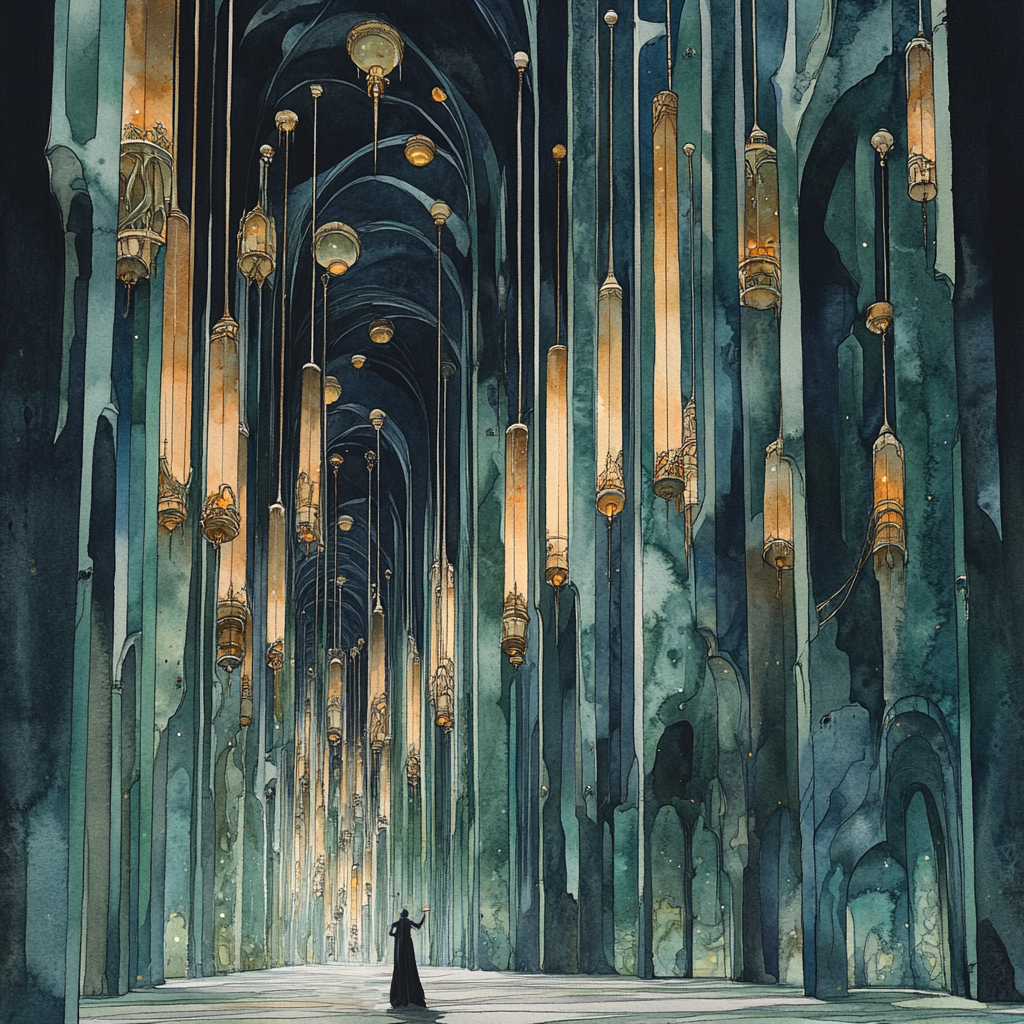Solonex
The Chiming Fate. LN lesser power of life, death, music and time (They/Them)
Pantheon: Unknown
Symbol: A tubular bell
Realm: Mechanus / The Chiming Halls
Known Proxies: Eckoringe (human proxy of Sonolex [he/him] / LN)

Musings of Thalias, Bard-Priest of Sonolex

Well then, cutter, you’ve must’ve heard the chimes before, yes? That distant echo you can’t quite shake, like the last note of a dirge or the soft tolling before a storm? Yeah, that’s Sonolex alright—our Sonolex. I’m Thalias, bard-priest of the Order of the Carillon, and I’ve been in this gig for… well, I can’t rightly say how long. Time’s a funny thing here, in the Halls. Some say Sonolex ordains the passage of time itself, after all. I used to think that was just some high-up nonsense—now I’m not so sure.
Sonolex, see, they ain’t like most powers. Not some fire and brimstone type, nor a coddling saint giving out blessings like candy. They’s a bit more… aloof. Sonolex governs the spaces between the beats, the quiet that follows the crash of the gong, that last rattle before life flickers or snuffs out. That’s their domain—music, fate, and time, all wrapped up in this sprawling maze of ceramics and song we call the Chiming Halls.
When you take up the tamtam—that’s the mallet you use to hit a chime, berk—like I did, you learn that your name doesn’t really matter much anymore. Sonolex asks for service, not identity. As a bard-priest, I’m assigned a chime. One single chime, in an endless sea of ‘em. Hundreds of feet tall, each one tied to a bunch of souls somewhere on a prime-material world who follows the way of Sonolex. I was told that when my chime rings, a life begins—or ends. Simple, right? But here’s the thing—Sonolex don’t always give us the full story.
I’ve rung my chime dozens of times, but I’ve never been told who it was for. Some days, I think I’m bringing new life into the world—a babe taking its first breath. Other days… I’m pretty sure I’m tolling the end for some poor sod who’s drawn his last. It’s unsettling, not knowing. The old-timers, the petitioners, they say that’s part of the lesson Sonolex teaches: we don’t own the moments, we just play our part.
The Halls and the Power
Sonolex himself? You’ll never see them. None of us have, at least not directly. Some claim they’ve spoken to Solonex when they’re alone at their chime, meditating in the quiet time between strikes, though I reckon that might just be wishful thinking. You can be waiting for weeks sometimes, see. A berk is liable to start hearing things just to fill the time.
What we do know is this—Solonex used to be a bit of a tyrant, back when they and their Halls sat in Tintibulus, a plane known for its endless noise. Over time, though, they shifted—literally and figuratively—becoming more detached now, less wrathful, more about balance and the eternal rhythm of life and death. It’s said the shift happened when Solonex realised the futility of trying to control fate with an iron fist. Now, they let the music flow, lets time happen. It ain’t power that’s bold enough to change their mind about something you know. Some might call it weakness, but it makes me love them more.
If you want to understand why they shifted, you’ve got to think bigger than a single life or event; you’ve got to consider time. After all, Solonex doesn’t just see time; they are time. Their philosophy and their realm have both bent and flowed with the ticking of ages. But why? Well, here’s a parable from the teachings of Solonex that might ring with some truth.
The Fable of the Grand Bell Founder
Long ago, there was a master bell founder who lived in a small burg on the Material Plane, and folk came from across the lands to hear the bells she crafted. The bellmaker was renowned for her perfectionism—she would not let a single bell out of her workshop unless it rang with absolute precision. In time, she built the largest Great Bourdon bell in the world, a thing of beauty and awe it was, perfectly tuned to the resonances of the celestial spheres. She believed this bell would bring order to the town, marking time and ensuring that every aspect of life flowed just as it was decreed.
When the bell finally rang, it was loud enough to be heard miles away. It echoed through the burg, dictating when farmers would sow their seeds, when merchants would open their shops, and even when children would be born. At first, all was perfect. Crops grew, businesses thrived, and the town seemed prosperous. But something odd began to happen. People stopped acting on their own. They stopped making decisions for themselves, stopped laughing, stopped loving even. They lived according to the bell’s commands, but without joy, without spirit. The town became a place of hollow routine, where actions were entirely dictated by the ringing of the Great Bell, and soon, it fell into despair despite its outward order.
The bellmaker, proud and blind, could not understand why. Wasn’t everything running perfectly? she thought. But one day, as she walked through the joyless town, the bellmaker stumbled upon a child—a boy who had never known laughter or song. He was playing with a cracked, misshapen bell he had found discarded. The bell was flawed, ringing unevenly and off-key. But the boy struck it over and over, laughing with every sound it made. Each flawed note brought a burst of joy that echoed through the empty streets.
The bellmaker, hearing this flawed melody, tumbled to her mistake. Perfection had no room for joy, no room for the unpredictable music of life. And so, in her final act, the bellmaker climbed to the top of the great bell tower and struck the Great Bourdon one last time. But this time, she cracked it deliberately. As the perfect tone shattered into a thousand pieces, the town awoke as if a heavy enchantment had been lifted. The people blinked, looked around, and began to laugh again, to sing, to live.
And so, the bellmaker learned that sometimes, the imperfect holds more beauty than the flawless. Life’s meaning isn’t found in regimented order but in the spaces between the notes—the laughter, the tears, the unexpected rhythms that make us mortal.
The Lesson of Solonex
Now cutter, they say that this parable mirrors Solonex’s own journey. In the early days, when their realm was in Acheron, they were much like the bellmaker—rigid, despotic, a power who demanded obedience to the iron laws of fate. They ruled over life and death with cold precision, and those who worshipped them were mere cogs in a grand machine, turning as Solonex dictated. There was no room for deviation, no space for chance.
But something happened. Perhaps they grew weary of watching souls follow predestined paths without spirit. Perhaps they heard the flawed, joyful sound of an imperfect life, much like the bellmaker heard the child’s laughter. Over time, Solonex began to shift, abandoning their rigid ways. They left Acheron behind and drifted toward Mechanus, where order and structure still reign, sure—but not as a tyrant, rather as a guide. Their realm became a place where the chimes of life and death still rang, but in harmony with the souls who lived them.
Solonex now teaches that life is a series of chimes—birth, love, sorrow, death—but it’s not the ringing itself that matters. It’s what happens between the chimes, in the silences, that gives life meaning. Their followers now meditate on the spaces between each sound, learning to embrace not only the inevitability of fate but also the joy of chance and imperfection.
In any case cutter, if you’ll excuse me I’ve rattled for too long. I need to get back to my chime, I can feel one of my gentlemen is nearing his end, and I mustn’t be late ringing that bell.
Source: Belarius and Jon Winter-Holt


